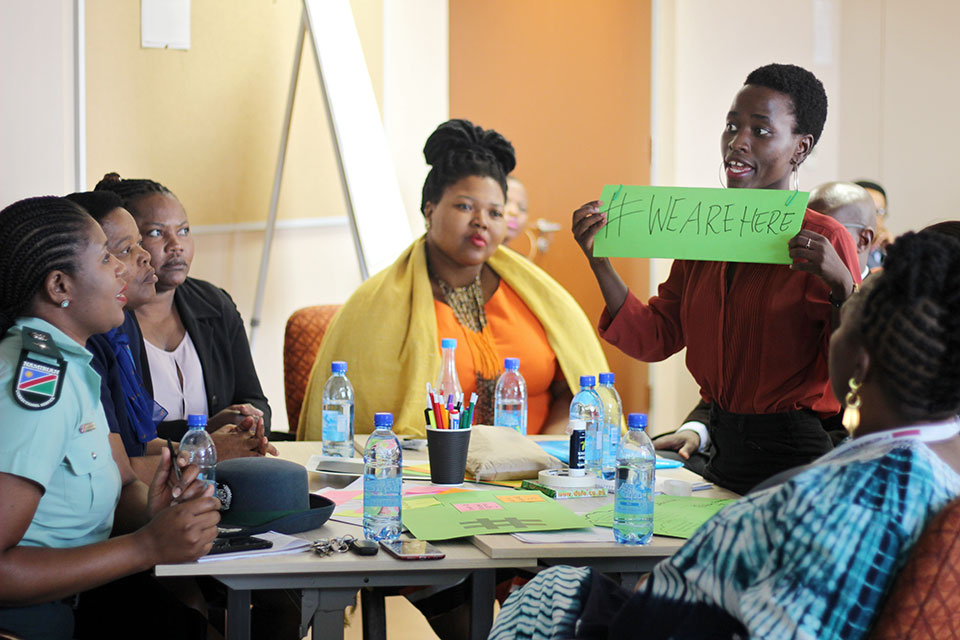
WPS Strategic Insights paper launched
ASPI launched its third Strategic Insights paper on WPS. This year’s collection of articles offers insights and recommendations to address some of the emerging challenges—including cybersecurity, health security and resource management with a strong focus on Australia’s engagement in the Pacific.
Global datasets on gender equality and violence against women released
A new global index scores countries based on their achievement of gender equality. Unsurprisingly, no country has achieved gender equality based on its underlying indicators. Nor will any country achieve this by 2030. Datasets and analysis like this index will play a crucial role in tracking progress on UN Sustainable Development Goal 5, to end gender inequality and empower women.
A new database tracking incidents of political violence against women not only aggregates data on the frequency of incidents but has uncovered trends in the types of political or sexual violence faced by women in different regions. The new data will be updated weekly and can be found here, along with an accompanying report.
Namibia adopts new WPS action plan
Namibia has launched the country’s first WPS national action plan, which incorporates emerging security issues such as climate change, cybersecurity and human trafficking. Namibia currently chairs the WPS Focal Points Network and is working to establish an international women’s peace centre in Windhoek.
O Canada
Canadian Prime Minister Justin Trudeau has announced C$1.4 billion per year will be provided to support global women’s and girls’ health by 2023. Approximately C$700 million per year will go towards sexual and reproductive health. Speaking in Vancouver at the world’s largest conference on gender equality, Women Deliver, Trudeau expressed deep disappointment with backsliding on women’s rights around the world.
Canada has appointed Jacqueline O’Neill as its first ambassador for women, peace and security. This role has a whole-of-government mandate to provide advice on the implementation of Canada’s action plan and its feminist foreign policy.
Stoush over UN language
Debate over the language to be used in a UN resolution on humanitarian responses is ongoing in Geneva. The New Humanitarian has provided in-depth analysis of the text changes and their effects, if they are adopted.
Impact of Trump’s global gag rule grows
The International Women’s Health Coalition has released a report which investigates the effect of US President Donald Trump’s ‘gag rule’ on marginalised populations in Kenya, Nepal, Nigeria and South Africa. It found that since the introduction of the measure, which requires any foreign nongovernmental organisation that accepts US global health funds to certify that it does not provide abortions, information, counselling or referrals and that it does not advocate to expand access to safe abortion services, women and girls are increasingly at risk of serious injury and death as they seek unsafe abortions. This piece in Foreign Policy examines the impact of the rule by looking at a not-for-profit group in Colombia affected by this policy.
US releases WPS strategy
The White House has released a new WPS strategy centred on four ‘lines of effort’: supporting the meaningful participation of women in decision-making, promoting the protection of women’s and girls’ rights, adjusting US international programs to better empower women and encouraging partner governments to improve the meaningful participation of women. This article lays out the reasons for the strategy’s release and analyses differences between this strategy and the previous US national action plan.
Gendered perspectives of violence in Latin America
This article by Chris Telley explores the failure of the US Department of Defense to consider gendered perspectives in Latin American conflicts. Recognising the newly released US WPS strategy, he argues that the DoD has failed to use women as a force multiplier to act as a conduit against corruption and to navigate the human terrain of conflict. He says a gendered lens can offer different perspectives on the sustainability of peace after a conflict and presents an opportunity to improve the military effectiveness at the tactical and operational levels.
International Day for the Elimination of Sexual Violence in Conflict
On 19 June, the International Day for the Elimination of Sexual Violence in Conflict, UN Secretary-General Antonio Guterres highlighted the importance of shifting to a survivor-centric approach. With this significant shift in UN Security Council Resolution 2467, the BBC has documented the stories of survivors detailing the ongoing effects of the widespread use of rape during the Rwandan genocide and the use of sexual violence against female protestors in the recent unrest in Sudan. The Global Network of Victims and Survivors to End Wartime Sexual Violence, known as Sema (‘speak out’ in Swahili), has called for the end of impunity for these crimes.
Understanding the link between climate change and women’s security
On 8 June, the UN celebrated World Oceans Day with the theme of ‘gender and the ocean’. Writing for CNN, Rebecca Loy has unpacked this relationship, considering areas such as the gender imbalance in marine conservation and oceans governance, particularly in the context of women’s greater vulnerability to natural disasters.
A report by Maram Ahmed has looked at the specific vulnerability of women during climate change–induced mass migration, noting that climate change adds ‘a new layer of complexity to the area of gender’ and will have significant cascading effects for the development and empowerment of women and girls.
Kyrgyzstan ‘space women’ look to the stars
In this Al Jazeera report, Hannah McNeish spotlights the Kyrgyz Space Program, which seeks to increase girls’ participation in space technology with the launch of Kyrgyzstan’s first satellite. Programs like this improve girls’ education and access to technology in developing areas.
Faces of war
To finish this month’s wrap, we recommend checking out this photo series by Joey Lawrence which documents women from the Yazidi and Kurdish communities in their fight against the Islamic State terror group.

